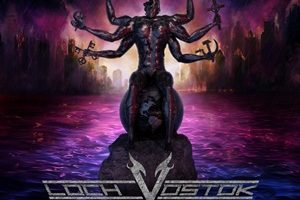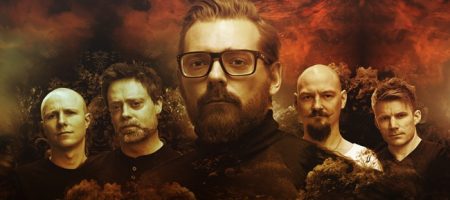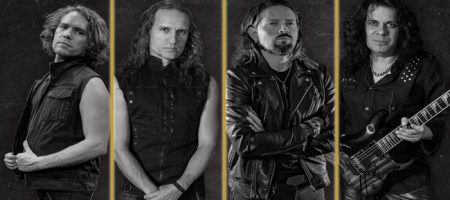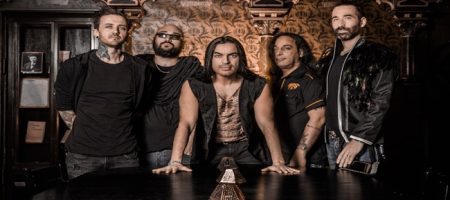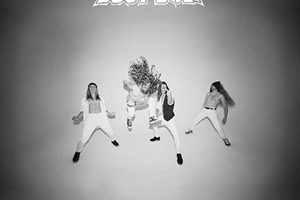Blame Zeus – Be Strong and Be Faithful
Sunday, 8th October 2023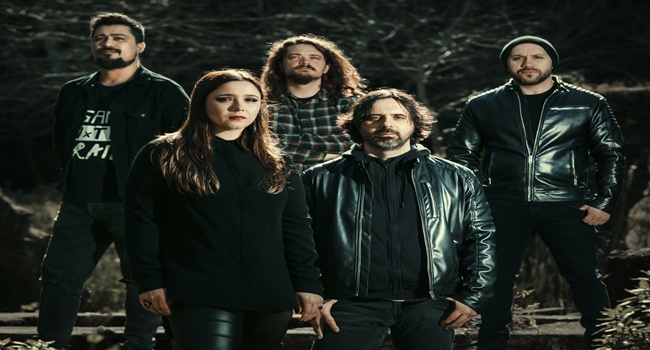
Active since November 2010, Blame Zeus hails from Portugal – a five-piece act that incorporates diverse influences across the alternative metal, rock, soul, and progressive lines. Consistently evolving and refining their sound, their fourth and studio album Laudanum pushes forth their strongest, most cohesive set of songs to date – chock full of memorable hooks, melodies, and musicianship that can stand the test of time. Wanting to learn more about the group, we spoke to vocalist Sandra Oliveira regarding her early musical / singing memories, the personal mental health themes that are chronicled through the new record, the evolution of the band through their discography, how she handles the challenges of vocals across different live environments, pivotal learning to self-manage the group, thoughts on Moonspell’s importance to Blame Zeus achieving their long-term goals, as well as what’s in store for live shows to support this record.
Dead Rhetoric: What are some of your earliest memories when it comes to music during childhood? At what point did you discover heavier forms of music – and then want to perform in bands yourself?
Sandra Oliveira: I started listening to music because of my brother. I have an older brother; we have a nine-year difference of age. He started listening to Queen, Bryan Adams, Nirvana. I started to listen to those kinds of songs and a little bit heavier sounds through his influence. And then I started to learn how to sing for myself and by myself when I was twelve. Then I discovered a lot of female singers I liked, like Alanis Morrisette, PJ Harvey, also Fiona Apple. I liked that kind of angry feeling, lyrics full of meaning and feeling. That’s basically where I come from, and then I started developing my tastes for heavier sounds from there.
Dead Rhetoric: Did you have any training in school growing up or are you self-taught?
Oliveira: When I was smaller, I sang at the choir in my church. It was a short period of time. At twelve I started singing for tv shows, stuff like that. I tried to get to know my voice as I was searching for my voice. I didn’t have lessons until I was nineteen. That was the age I started working, and I had the money to invest to have a better musical education. I can now say that due to my hard work I teach people how to sing, I’m a vocal coach. I have been studying ever since.
Dead Rhetoric: Laudanum is the fourth and latest studio album for Blame Zeus. What can you tell us regarding the songwriting and recording sessions for this effort – were there challenges, surprises, or obstacles to overcome throughout this process beyond the COVID-19 pandemic?
Oliveira: Actually, Laudanum has been a result of all of these frustrating years that we went through, all of us. I can say that because we released the previous album Seethe in 2019, at the end of the year. It was very cool with nice results, nice feedback from everyone, and we were starting to see 2020 as a year that we would do a lot of cool things and tour. Unfortunately for everyone, COVID came up, so Seethe was left on standby for two years more or less. Laudanum is like the Hail Mary. Seethe didn’t work because of the timing; now we have reinvented ourselves and gotten better by getting through all of this. We know our value. That’s what this album represents to all of us. This is the best that we can do so far. And this is the best of us done for you.
Dead Rhetoric: This record is deeply personal for you, conceptual in nature as it chronicles your personal battles with depression and anxiety. Can you delve into some of the lyrical content, and do you feel a sense of cleansing/catharsis putting these ideas out through your words and melodies – where do you feel you are at now when it comes to these issues in your life?
Oliveira: I feel like in a very unexpected way, I organized things in my head. When I was writing the lyrics for the album, I organized things as they were happening to me. The order of the songs, and all of the lyrics and meanings, even musical aspects like dynamics, they have meaning behind it. I’ve been battling depression for a long time in my life. Last year was actually when I hit rock bottom in a very hard way. I started doing medication, going to the doctor, getting my mental health in check. I needed help, I asked for help. Laudanum, the order of the songs, they reflect the order of the stages that we go through when we go through something like this. The trauma, the hitting rock bottom, the thinking that life is no longer livable, no longer something that we want to be in. Starting the medication, all the side effects on the first few months, getting used to feeling like this. I’ve had anxiety for so long, it was strange for me not feeling that. It was something (scary) that was becoming something that I was, something that was a part of me. All of these songs have different meanings because of all these stages, all of these feelings that came from this journey of depression and cure that I am still going through.
Dead Rhetoric: Tell us about the video shoot you did for “Left For Dead” with Unbox Films – which combines band performance footage and an almost cinematic thriller narrative aspect with the two actors. How did the visuals develop, and what are your thoughts on the video medium in promoting the band through social media platforms?
Oliveira: “Left For Dead” is a song that talks about resilience and forgiveness. Although it doesn’t seem that way in the first view of the song. We wanted to reflect that resilience, that strength that comes from being in so much pain that nothing can hurt you ever again. You are stronger than ever, because you are at your lowest – you get this sense of power, because no one can hurt you more than you’ve been hurt before. That’s what we wanted to transmit with the video and the story. The story is about this girl, she has been kidnapped by some guy, and she gets loose and runs away. Obviously in the end, it’s a relief that she gets to get away from him, and she’s the one who gets to defend herself, and get on top of the situation. Although she is bloody, sweaty, and dirty, all of the things that you would feel mentally in the situation, if you were to think about that. And then she cleans herself in the end, she forgives herself, and she goes after what she wants which is freedom and cures herself.
Dead Rhetoric: Where do you see the greatest changes or growth that has taken place in the decade-long career of Blame Zeus record to record?
Oliveira: We have four records so far. I think that Seethe was the mark of a big change in our sound. Seethe was the third album. We made the first album with two guitarists and a bassist that are no longer in the band. And the second album with two guitarists that are in the band, but a different bassist. In Theory of Perception, which was the second album, we were still searching for our sound. You have a lot of different songs and different sounds. With Seethe, we knew each other musically very well at that point, we had a cohesive album. We have that unity of sound; we found our sound. And Laudanum is an upgrade of that, we are the same two guitarists, different bass player, but it still sounds like an upgrade from the heavier sounds that Seethe presented, and a big difference from Theory of Perception that had a lot of ballads, we even did some acoustic shows for that album because it was possible to do it.
Dead Rhetoric: You also work as a vocal coach beyond your own musical pursuits. What do you enjoy most about the work that you do with your students – and where do you see the biggest challenges most of your students face to get better over the long term?
Oliveira: I really love what I do. I learn so much from what I do with them. The hardest thing for anyone, not only in learning how to sing but with other instruments, is to have the discipline to study and to experiment. It’s the most difficult thing, to find a place in their daily routine where they can get in a room alone, with a mirror with a phone or a computer and do the exercises. The voice is a muscle, it needs to be worked on, you need to go to the gym. It’s the most difficult part for me as a teacher, convincing them that this is very important. Change is not going to happen from one day to the other. You need a lot of work and years to get to a point where you feel comfortable with your voice, you know your voice, you know your limits, and (become) perfectly aware and comfortable with yourself on a stage.
Dead Rhetoric: Where do you see the differences in your own voice for the studio versus the stage?
Oliveira: It depends on if I have a good stage sound or not. I feel a big difference from year to year, album to album. Even in the studio work, I feel my voice has been progressing a lot throughout the years. In the recent concerts, last year and this year, I have devoted myself to perfecting my vocal performance. Because sometimes, songs are hard to sing. Breathing is hard, the notes are high, and you have to make choices. Sometimes you can’t be headbanging, jumping from one place to the other, then stop and you have a really big chorus with a lot of energy, and you don’t have the energy. My choice was to have my stage presence, be one with the audience, speak to the audience, but I decided to be more of a vocal performer than a physical performer.
If I can hear myself, and if the sound isn’t confusing on the stage – I will get the tone perfectly. It’s hard sometimes to get the tone, it depends on the exterior things as well.
Dead Rhetoric: What do you enjoy most about working with your husband Ricardo, as you play together not only in Blame Zeus but also the doom metal band Perennial Dawn?
Oliveira: I know that I am being subjective about this, I think he is the best drummer in the world. He is also a teacher; he is a master in classical percussion. He’s been studying this all his life. He has discipline, he studies every day for many, many hours. It’s a great pleasure to have someone like that on my team. Although we don’t think of each other as husband and wife within the bands. In the bands we are colleagues, we are family, we are bandmates. We don’t want to make anyone feel uncomfortable with anything. We want to be a group versus the two of us and the others. We’ve managed well in our personal lives as a couple and being in a band with other people, and just being one band member. I’m very proud of him.
Dead Rhetoric: What are your thoughts on the state of the heavy music movement across Portugal as well as the global movement?
Oliveira: In Portugal, we are kind of a small country. But we have a very strong, small metal and rock audience. Maybe because the country is small, the people will travel to see a band that they like, and to support their friends and local bands. It’s a small group, niche audience. They are very strong supporters. And they do tend to grow, in certain situations. In comparison to other countries, we could go see live music more.
Dead Rhetoric: Does a band like Moonspell inspire you to be able to appeal to a worldwide audience seeing their level of success?
Oliveira: Of course. We’ve played with Moonspell before, and we know some of them personally. Moonspell has done some kind of a miracle. They’ve been able to grow outside of Portugal. We also have Gaerea, that’s another Portuguese band who are going on to bigger things. I think they have another US tour coming up. These kinds of bands really inspire me because they had to do the work. They didn’t want to stay at home, they went to rehearsals, they wanted to get better. They accepted opportunities when they appeared. That is very important to me. A lot of bands that we have here, even a lot of bands from the 90’s, are great bands, and some of them didn’t make it outside (of the country), just because they didn’t want to. They didn’t feel comfortable touring and traveling. It’s a big lost opportunity. If something like that happened to me, I would jump at the first opportunity to do a tour with a big band and play our music to as many people as we could reach.
Dead Rhetoric: What is a pivotal or critical moment that helped shape your musical career?
Oliveira: A very important moment was before we released the first Blame Zeus album Identity. I got to acknowledge that I would have to do a lot of things that I didn’t know how to do. Just before it came out in 2014, I thought that no one was going to do this for me. I had to do the work. I’m not talking musically, as that was covered – I’m talking about promoting my band, managing the band. Organizing everything, doing the merch, selling the merch, being responsible, taking care of the money that we had to reinvest in everything else. I am basically the band’s manager because I take care of everything, other than the music. That moment when I thought I had to learn how to do this effectively – and then I started researching and started talking to other people that were already in the business. That was a pivotal moment, that dedication that I had before was only musical, and then it started to get broader and bigger to also learn how to move in this industry and manage a band to get to the point that we want to be (at).
Dead Rhetoric: What are three albums that helped shape your outlook on heavy music – and what’s your favorite concert memory, attending a show purely as a member in the audience?
Oliveira: Three albums – I would say A Perfect Circle – Mer de Noms. I listened to that album a million times – I really love Maynard James Keenan and his way of singing. Lateralus from Tool would be my second choice. The first album I completely dove into when I was fifteen was Jagged Little Pill – Alanis Morrisette. These were three albums I really like. Now after my late twenties, early thirties I started listening to heavier stuff like Gojira, Alice in Chains, the more recent albums. In This Moment I really like that band as well.
A moment in a concert. I think it was back in 2017, Soen is a Swedish band. They were on tour with a band, Madder Mortem, which also has a female vocalist. I loved her so much – she was completely at ease with everything that she did on stage. She was living it, she really inspired me. It was all music, it wasn’t her being all pretty, the clothes, the theatrics – it was just her, the band, and she was rocking to the core. I had the pleasure to meet her afterwards and we became Facebook friends and have talked after that.
Dead Rhetoric: When you feel overwhelmed or you have lost your focus, what types of things do you like to do to regain perspective?
Oliveira: I’d say pause, stop for a moment. That happens to me a lot of times because I start freaking out if something doesn’t go according to plan. I can be a little bit controlling on that. When I need to focus, I stop, try to rest, and try to get off of social media. Get out of my phone, go take a walk or something. Rest and reconnect with nature. Think about things in a different perspective.
Dead Rhetoric: What’s the game plan for Blame Zeus over the next year to promote this record?
Oliveira: We would like to tour very much. It’s not easy to come by, but we are planning to start with Spain. We are starting to contact some festivals here in Portugal and in Spain. We are available, let’s see what happens and what comes by when the album is released. We are still waiting for some reviews; we would like to know what everyone thinks about this (album).











